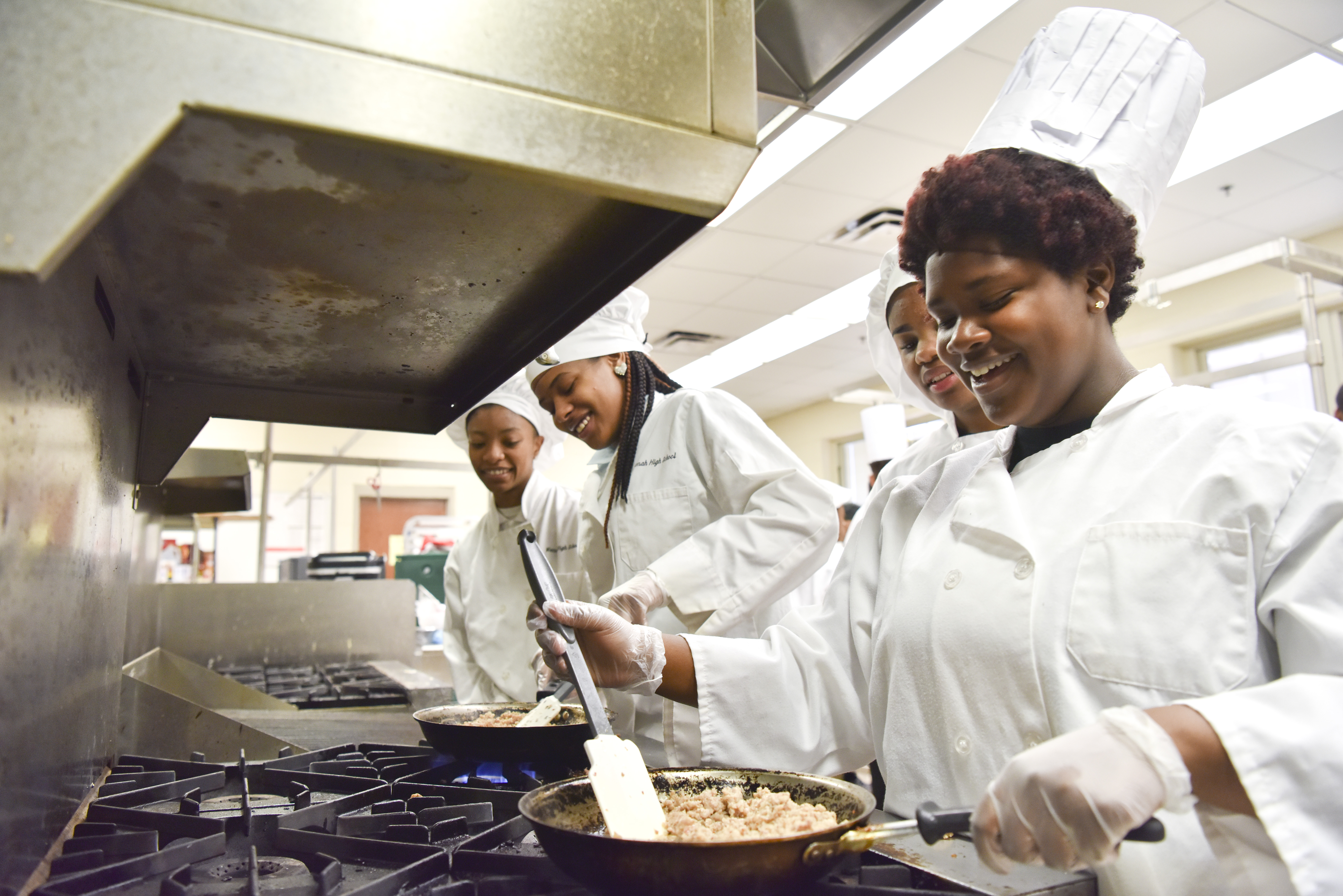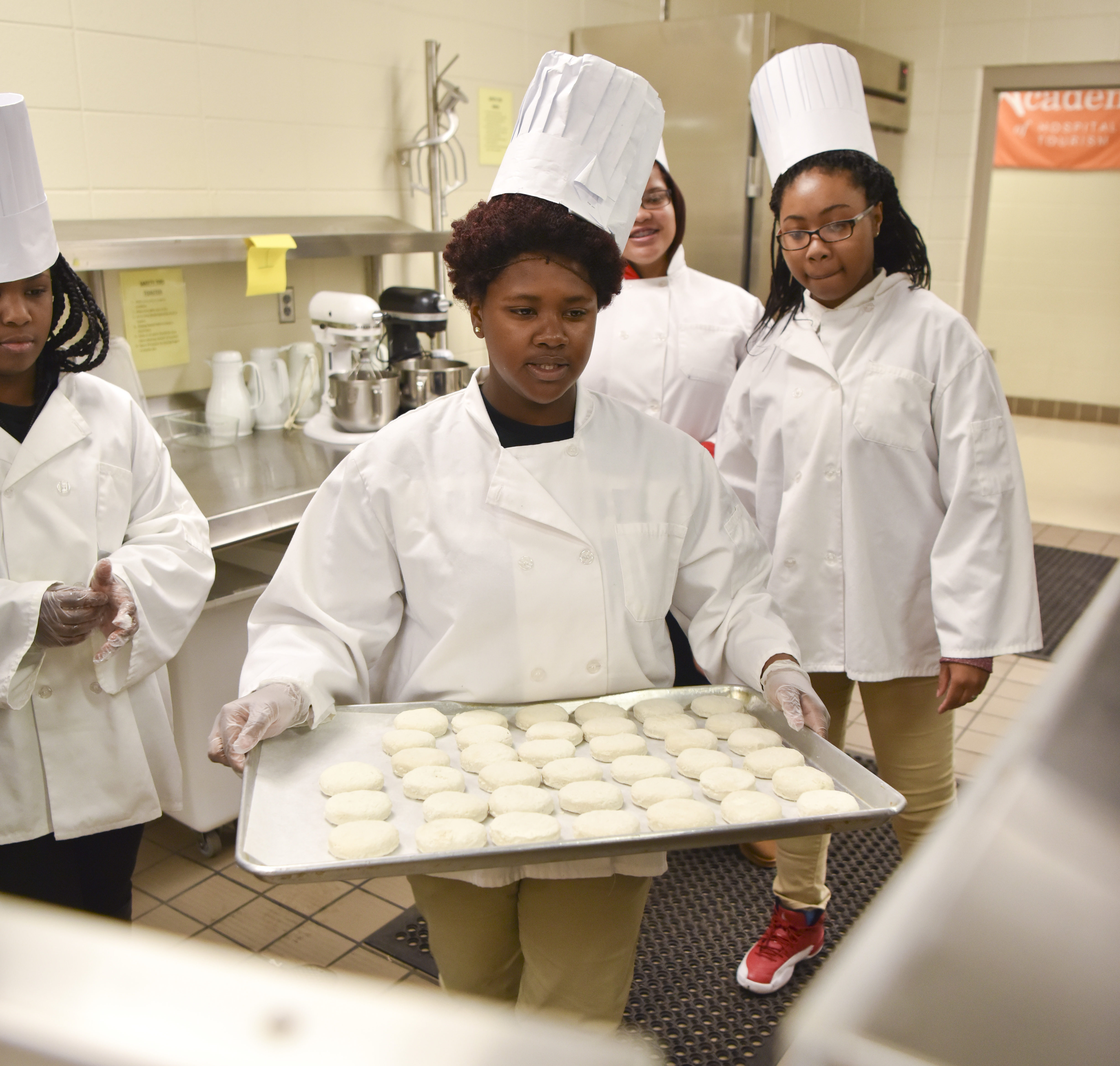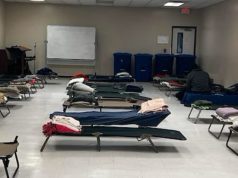
By Ariel Worthy
The Birmingham Times

On the second floor of Wenonah High School in Southwest Birmingham is a commercial kitchen with appliances seen only in professional settings: convection ovens; large gas stoves; steamers; a deck oven for baking pizzas; a commercial mixer, fridge, and freezer; a griddle; and a salamander heater, which sits on top of the stove.
Inside the kitchen, students season a variety of foods to perfection and measure ingredients properly to meet a deadline. They are preparing for the 14th Annual Unity Breakfast on Friday, Feb. 24, where more than 800 guests, including special guest speaker the Rev. Al Sharpton, will be served. On the morning of the breakfast, students will arrive at school by 4 a.m., said Diann Pilgrim, who directs Wenonah High’s Academy of Hospitality and Tourism (AOHT).
“The whole week, we’re actually preparing for the breakfast. We go in the day before to put tablecloths on and set the tables, to set up for serving our food, and to decorate—we do our own centerpieces,” said Pilgrim, who has been a Family and Consumer Sciences teacher at Wenonah High School since 1988.
Award-Winning
The lauded culinary arts program—which has earned several state medals in competitions, including one from Culinard, the Culinary Institute of Virginia College in Birmingham—involves much more than preparing for the annual breakfast. Throughout the year, students make chicken Alfredo, homemade pizzas (for which they prepare their own dough), red velvet cake with cream cheese frosting (from scratch), quiche, twice-baked potatoes, and other dishes for various events. The students also complete a lab, during which each group makes different types of salads, such as seven-layer, Caesar, and pasta.
“I like cooking. I like being behind the scenes and just staying in the kitchen, so I want to go to school to study to be a chef,” said Brandon Walden, a senior. “I used to want be a truck driver, and I still could, but I want to be a chef and be in the kitchen.”

Well-Rounded
The AOHT ensures that students get a well-rounded curriculum on the hospitality industry. Freshmen are taught an understanding of the business world. Sophomores are introduced to industry principles. Juniors begin cooking and participating in internships with local hospitality and tourism businesses. And seniors learn about the finer points of culinary arts to advance their career-building skills.
Students also take field trips to area businesses and events.
Aaron Harris, a 17-year-old junior got to meet former White House Pastry Chef Roland Mesnier in October, 2016 at The Club, one of Birmingham’s most renowned social and dining establishments.
“He taught us that it wasn’t going to be easy,” Harris said. “He didn’t start out cooking. He was mopping floors, and as he cleaned he would watch the chefs prepare the foods. He eventually worked his way up to being the White House pastry chef.”
Mesnier gave students cookie cutters and menus from the White House, and signed copies of his book, “The Sweet World of White House Desserts.”
“It made me appreciate this even more because of what he went through,” Harris said. “We’re learning stuff that people don’t learn until they’re adults.”
Experience
Students get experience by working at various locations, including Ross Bridge, the Sheraton, the Westin, Embassy Suites, the Birmingham Zoo, the McWane Center, and the Crossplex.
“There’s the culinary side, but we also try to show them the entertainment and sports side of it [at the Crossplex],” Pilgrim said. “The students come in and see what goes on behind the scenes of a track meet or a swimming event.”
Senior Breanna Jordan, 18, said she was offered a restaurant job during a conference at the Harbert Center in downtown Birmingham.
“Because I am able to say ‘I’m a culinary academy student,’ more people have been willing to hire me,’” she said.
This fall, Jordan will attend the University of Alabama, where she plans to earn a degree in chemistry. Afterward, she plans to attend Auburn University to receive a degree in pharmacy and then attend a culinary institute to become a pastry chef.
“I’ve been cooking since I was eight, and I’ve always loved to cook,” Jordan said. “My mother started cooking at an early age, and she instilled that in me.”
Jordan said she has enjoyed learning new recipes in the academy, and often cooks for her family now.
“I learned how to make quiche, and I make it for my family all the time,” she said.

Career Opportunities
The AOHT has helped students in other ways, too.
“When I first got here, I was terrified of being in high school, and I really wasn’t a people person,” said Alexus Dunn, a senior. “Being in the academy helped me become friends with people I never thought I’d be friends with. Now we have lifelong friendships, and I’m more involved in school.”
The academy introduces students to different types of career fields, Pilgrim said.
“Some of them come into the academy and don’t have any idea what hospitality and tourism are about,” she said. “Then when they learn more about it and get into culinary arts, they say, ‘I want to be a baker’ or ‘I want to work in a restaurant.’”
Life Skills
Even if students don’t enter the hospitality field, the AOHT program provides valuable life skills.
“Now they can cook for their families or cook for themselves in college, and they know how to cook healthy food,” Pilgrim said. “We try to do baked chicken tenders instead of fried. We show them that there are healthy ways to make traditional dishes.
“We [also] train them … how to be better consumers and how to shop for groceries on a budget,” she said. “We show them what it’s like to serve when they go out to eat. They pick up on so many things that they don’t even realize.”
What they learn through the AOHT is beneficial in other classes, as well.
“Measuring is math,” Pilgrim said. “They learn the difference between ounces and cups, and it makes more sense in math class now.”
Although cooking is a big part of the academy, it is still run like a traditional classroom, Pilgrim said: “They would cook all day if you let them, but we have to stop and actually study what we’re doing. Sometimes they think we’re just going to cook and eat, but we do have tests, such as safety and sanitation tests—and they have to score 100 percent on the test to pass.”
Deeper Than Cooking
Pilgrim, who has taught at Wenonah for 29 years, knows the impact of culinary arts.
“My parents have a restaurant, and I grew up in the industry,” she said. “Food was the center of everything with us. Celebrations, parties, anniversaries, sad occasions, everyone gathered around food, and it made everyone feel good.”
Pilgrim’s students get that sense of fellowship in class.
“She always makes sure we have eaten when we get to school,” said Sakinah Townes, a senior. “She’s always checking on us and making sure we’re OK. She looks out for us in every way possible.”
Pilgrim surprised Townes with a birthday cake as they celebrated the senior’s 18th birthday.
“It’s deeper than just cooking with her,” said Townes.



